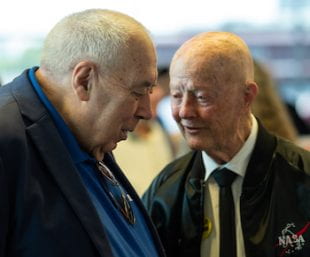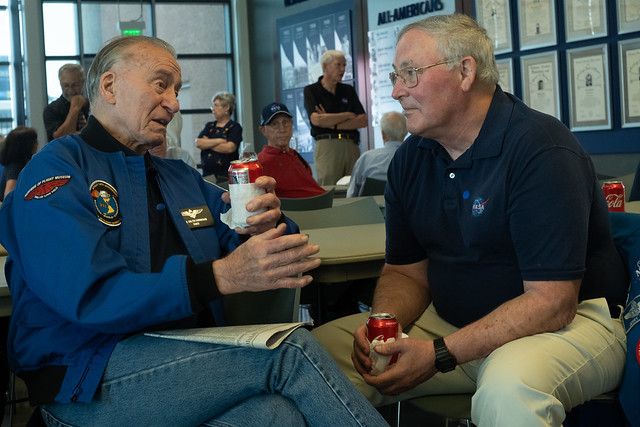Rice Stadium, site of JFK’s ‘We choose to go to the moon’ speech, hosts those who made it happen
NASA engineers, technicians and mission controllers who worked on the Apollo 11 flight joined astronauts from all eras of space travel in a celebratory gathering at Rice Stadium on May 20, two months to the day before the 50th anniversary of the first moon landing.
They were called together to shoot a video on the very spot where President John F. Kennedy vowed the United States would land a man on the moon “not because it is easy, but because it is hard.” You can see their reunion video above, as well as a behind-the-scenes video by Rice’s Brandon Martin featured here.
But the occasion also provided an opportunity for Apollo veterans to catch up, talk about their accomplishments then and since, and look toward the future of America’s space program.
“A lot of people asked me about the race against the Russians,” recalled environmental systems engineer John Whalen, who started a 50-year career at NASA in 1962. “Our job was to get the environmental control system ready to go, and so we couldn’t think about the Russians as much. That was upper management.”

The NASA video imagined astronaut Bill McArthur’s life as he watched the Rice Stadium speech as a child and became an astronaut himself. McArthur flew three space shuttle missions. Photo by Jeff Fitlow
Yet the NASA veterans found Kennedy’s speech inspiring. “When I look back on it and see the importance of what he was saying at that time, and then for me to graduate from school and go to work in the space program, it means a lot more to me now,” said safety systems engineer George Fletcher, who attended the speech with fellow seventh-graders in Houston.
Astronaut Mario Runco, a veteran of three space shuttle flights in the ’90s, remembers being inspired by the speech and the nascent space race. “I was 10 years old in September 1962,” he said. “I grew up in NYC and I had no clue what Rice University was, where it was. That all became apparent much later on when I got a little closer to the subject. But I remember the speech. I think I can today probably repeat it.
“I was thrilled and wanted to follow the exploits of the astronauts, and hopefully beat the Russians at the time,” he said.

Mario Runco, a veteran of three space shuttle missions. Photo by Jeff Fitlow
JFK’s speech was only one of many links between Rice and the moon landing effort, which started before the first Mercury launch when Rice donated land for Johnson Space Center (JSC) and culminated with the design of experiments that remain on the moon to this day.
The connections to the space program have grown through generations, with Rice sending a number of its best into the astronaut program, including Peggy Whitson, who has spent more time in space than any other American, and Houston native Shannon Walker, who earned three degrees at the university. Rice scientists and engineers inform and enhance NASA research and help shape the future through the Rice Space Institute and the Baker Institute for Public Policy, where former JSC director George Abbey is senior fellow in space policy.

George Abbey, left, with Chester Vaughan, a veteran Apollo engineer and former chief engineer of the International Space Station, at Rice on May 20. Photo by Jeff Fitlow
Abbey would like to see humans back on the moon as a stepping stone to Mars, a view he expressed in his 2016 recommendations to the next occupant of the White House. That, he wrote, would help resolve the many technical issues standing in the way of NASA’s larger ambitions.
“Going back to the moon and getting onto Mars is pivotal for humanity,” Runco agreed. “Mars is similar to the Earth – or at least at one time it was – and may have had the potential for the development of life independently of Earth.”
In the search for ancient life on Mars, he believes humans would do a better job than mechanical rovers. “That would change humanity’s mindset as to its perspective in the universe,” Runco said.


